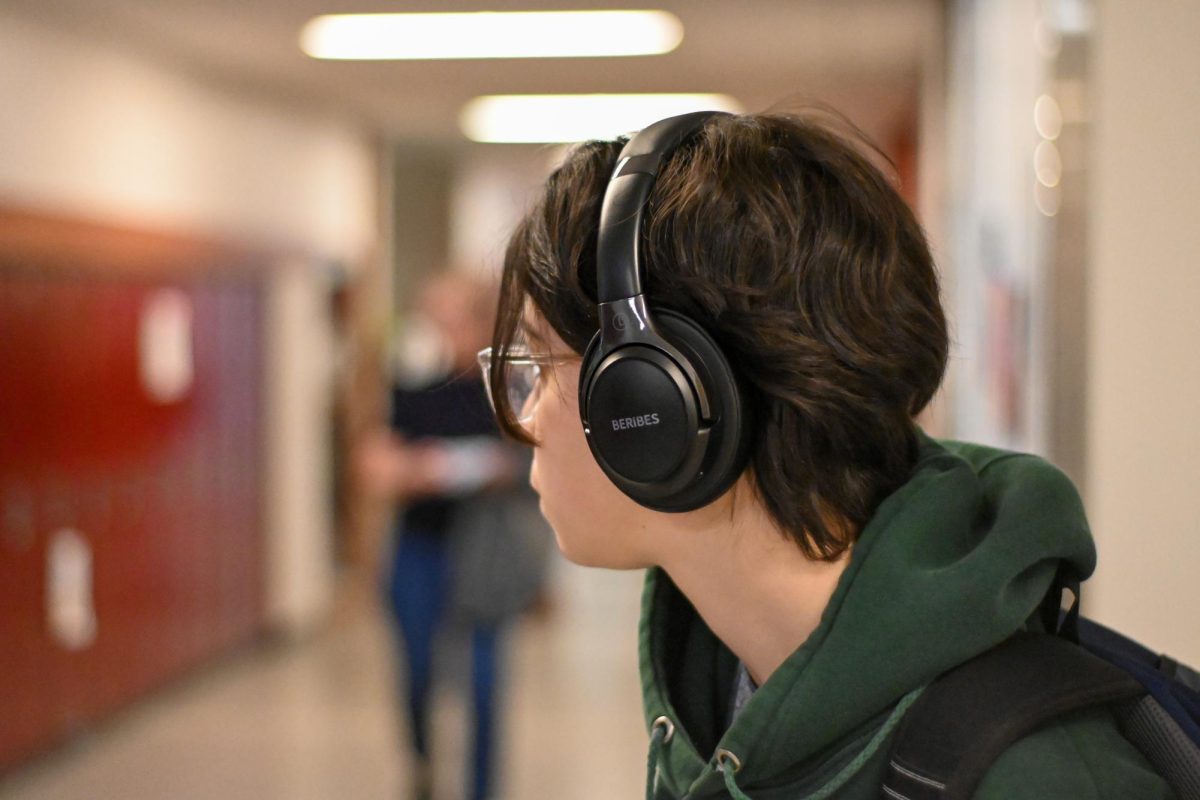Updated Jan. 12, 9 p.m.: A line in this story has been updated to clarify that Camille Baughn-Cunningham said she felt less optimistic — not more optimistic — when she saw students walk in with headphones on while she stood in the hallway greeting them.
The hallway buzzes with chaos: lockers slamming, laughter echoing and sneakers squeaking. Junior Austin Siu strides through, headphones in and his favorite song drowning out the noise. He glances at the usual sights of rushing teachers and huddled students, but he stays in his bubble.
Headphones have become a regular sight in hallways during passing periods with many students reaching for them the moment class ends, creating a personal retreat.
While it may appear to be just a way of enjoying music or listening to podcasts, headphones have become not just a tool for students to listen to school assignments, they are now a source to cope with stress and momentarily escape academics.
“It’s mostly just music, maybe sometimes podcasts, but it’s nothing super academic,” Austin said. “The result of listening to music is a sort of relaxation but it’s more to take my mind off of things that are bugging me in day to day life.”
Austin’s use of headphones reflects a broader trend among students with the majority using headphones to refresh after class and take their mind off of academics.
“I really like music and walking around the hallways,” Austin said. “There’s not really a lot of things to do and you’re thinking about stuff that you don’t need to be thinking about, which causes a lot of extra stress.”
Despite headphones becoming a personal escape for students during passing periods, the choice to wear headphones isn’t without its negatives. Listening at high volumes and prolonged periods of time may result in hearing impairment, according to the National Institutes of Health.
On the other hand, they can also create social barriers.
“I don’t think the headphones help with my approachability,” Austin admits, “but I think overall I would take listening to music and having less stress rather than care about social interactions.”
Camille Baughn-Cunningham, a counselor, acknowledges that students may use headphones for a variety of reasons both in and out of class, but also notes the potential downsides of reduced social engagement.
“We recognize that these passing periods may be an important time to destress and relax, particularly before there’s a test or a project, so it may be really critical that a student does something to set their mind straight,” Ms. Baughn-Cunningham said.
But Dr. Baughn-Cunningham also said she felt less optimistic when she saw students walk in with headphones on while she stood in the hallway greeting them.
“The whole interaction gets changed a little bit if I see someone with headphones on,” Dr. Baughn-Cunningham said.“I think that, are they going to hear me? Are they even paying attention to their surroundings and the people around them?”
While Austin continues to navigate the hallways embracing the calm and focus that his headphones bring him, the crowd has begun to thin out. As he reaches his classroom, the passing period nears an end, but Austin’s mind is relaxed and ready to tackle the next class.

























































Mark Krewatch • Jan 8, 2025 at 10:53 am
Did you perchance mean “less optimistic” when you referred to Ms. B-C’s quote that follows?
It seems like her next quote is the “downside” you noted at the beginning of this section of the article, as you introduced a balance in her thinking. What Ms. B-C describes doesn’t quite sound “more optimistic.”